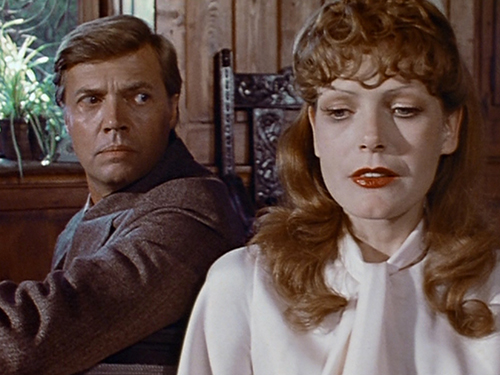
“I find women more interesting. They don’t interest me just because they’re oppressed – it’s not that simple. The societal conflicts in women are more interesting because on the one hand women are oppressed, but in my opinion they also provoke this oppression as a result of their position in society, and in turn use it as a terror tactic.”
Rainer Werner Fassbinder1
“Possibly the most twisted film of Rainer Werner Fassbinder’s career, Martha (a favorite of his frequent cinematographer Michael Ballhaus) catalogs the tyrannical hold a bourgeois husband has over his wife. The similarities between this absurd tragicomedy and Luis Buñuel’s Él (itself a precursor of sorts to Alfred Hitchcock’s Vertigo) are unavoidable, and as such Fassbinder’s film plays out as a loose remake of Buñuel’s Mexico-era masterpiece. (Even the film’s elaborate dinner sequence brings to mind Buñuel’s warped renditions of the Last Supper for both Viridiana and The Exterminating Angel.)”
Ed Gonzalez2
Pier Paolo Pasolini: One of my characters says: “While society represses everything, man can do anything. When society begins to permit something, only that something can be done”. This is the terrible result of our new liberties: a greater conformism than ever before. Today’s tolerance is false, because in truth nobody has ever had to be as normal and conformist as the consumer; and as for hedonism, it belies a decision to predetermine everything with unheard of cruelty.
Rainer Werner Fassbinder: The everyday oppression people experience is criminal. I could almost go so far as to say that you really can’t make anything but crime films. Everything should be declared criminal. You read the paper, listen to the news, and you get madder and madder at what you hear, see, and read. I got to the point where I didn’t feel like doing anything but portray criminal situations.
Here there is a desire to kill. And this desire bonds us together like sinister brothers in a sinister failure of an entire social system. I pay a price with the life I lead... it is like descending into hell. The first tragedy is a shared, obligatory and mistaken education that forces into us the need to have everything at all costs. Everyone is guilty, because we are all ready to partake in this game of massacre in order simply to possess. The lessons we have been taught are: have, possess, destroy. A horrible New Prehistory will be the condition of late capitalism until its end. Late capitalist industrialisation will dry the seed of History. That’s why a structural revolution is necessary.
But I’m basically against any form of organization. I’m a romantic anarchist. How can we preserve individuality in a totally organised society, in a system that will soon be using computers to store information on each of our habits and preferences, if we don’t fight it with halfway similar methods? As in fact the reactionaries are doing. As for democracy, I understand it as something that functions like a kaleidoscope, that is, not permanent revolution, but permanent movement, permanent questioning by every generation.
I miss the pure, direct revolution of the oppressed people whose only aim is to free themselves and determine their own destinies. I believe such an historic moment could still arise in the future. But I want to be clear: I go down into hell and I know things that do not disturb the peace of others. But hell is now coming up to everyone.
That’s why the theme of my films has remained the same, and always will: the manipulability, the exploitability of feelings within the system that we live in, and that at least one generation or more after us will certainly have to live in. Take terrorism. In the last analysis terrorism is an idea generated by capitalism to justify better defence measures to safeguard capitalism.
The bourgeois is a vampire that finds no peace until it has sunk its teeth into the neck of its victim for the pure, simple and natural pleasure of seeing her turn pale, sad, ugly, void of life, contorted, corrupted, ill at ease, full of guilt, calculating, aggressive, terrifying, just like him. Workers, intellectuals and students alike have all been bitten at night by the vampire and they too are unwittingly becoming vampires themselves!
Only those who are truly identified with their own selves no longer need to fear fear. And only those who are rid of their fear are capable of loving nonjudgmentally. The ultimate goal of all human endeavour is to live one’s own life.
An imaginary conversation between Pier Paolo Pasolini and Rainer Werner Fassbinder3
- 1Rainer Werner Fassbinder, “The Anarchy of the Imagination: Interviews, Essays, Notes”, Baltimore: Johns Hopkins University Press, 1992.
- 2Ed Gonzalez, “Martha,” Slant Magazine, September 2003
- 3Fabio Vighi and Alexis Nouss, “Colloquio/Gespräch: An Imaginary Dialogue Between Pier Paolo Pasolini and Rainer Werner Fassbinder,” Cambridge Scholars Publishing, 2010.

